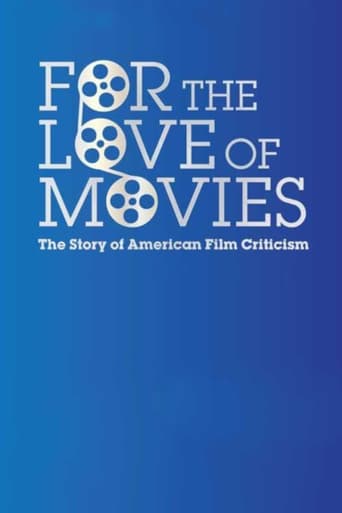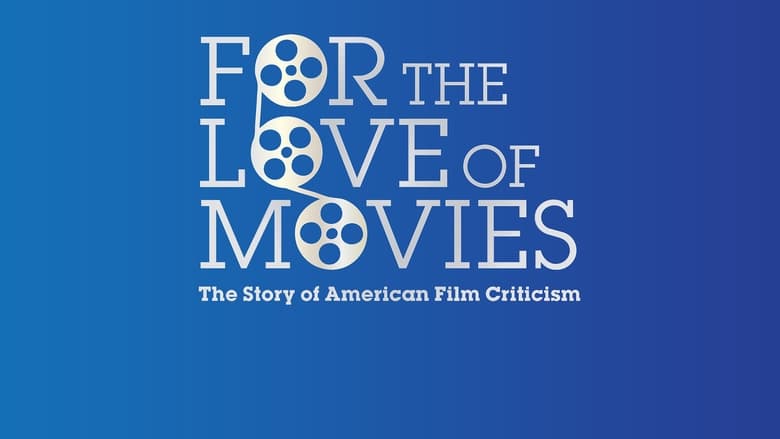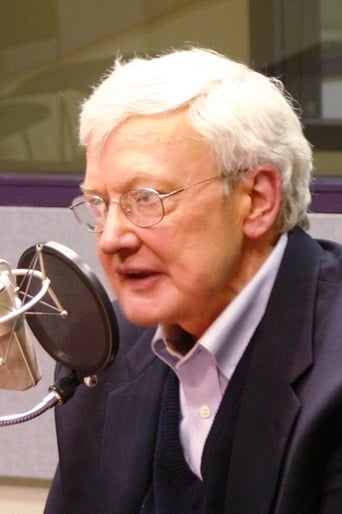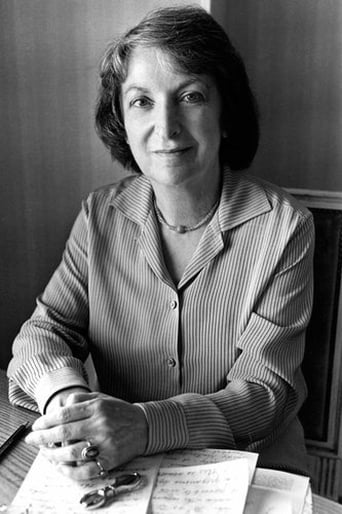For the Love of Movies: The Story of American Film Criticism (2009)
The story of American film criticism.
Watch Trailer
Free Trial Channels
Cast


Reviews
Surprisingly incoherent and boring
Sadly Over-hyped
Expected more
Excellent, a Must See
Since there are so few resources on the critique of film criticism (i.e., meta-criticism), a film like this is very interesting to me, and I suppose many others who are the frustrated film critics writing down their thoughts/opinions in venues like this on IMDb! I enjoyed listening to what Andrew Sarris and Pauline Kael had to say, as well as Roger Ebert and a fantastic-looking Molly Haskell. Many of the other critics seemed a little too self-important and full of themselves, which wasn't much of a surprise to me.The problem I had with this film occurred at the beginning and the end of it, where director Peary laments the fact that film critics are being fired at newspapers, like Elvis Mitchell, Jami Bernard, and Michael Wilmington. While I take no pleasure in people losing their jobs, it was hard to feel bad for people who clearly would end up landing on their feet doing something else. As much as I like film criticism, these people are not curing cancer, and I fail to see the "crisis" of film critics losing their jobs.
I love this examination of the rise and fall of the professional film critic... while today we have Roger Ebert, Pauline Kael and A. O. Scott, in the beginning this was just not so. This documentary shows how the critics (notably Frank Woods) pushed how film was more "subdued" in its acting than theater and how Pauline Kael helped get Martin Scorsese noticed.I loved the bit on "Two Thousand Maniacs" from Elvis Mitchell, which briefly touched on the b-movie sensibility. Indeed, not all films can be reviewed by the same meter.I also liked how they used "Amelie" as a example of difference, with one critic loving it and another saying it was nothing but a "cartoon" with "no human dimensions". This is quite the difference.And, of course, one much touch on the effect of the Internet Movie Database and the Internet in general on film criticism. Is it democracy on the rise, or a race to the bottom? I can see it both ways.
Witty, long-overdue documentary narrated by Patricia Clarkson chronicling the colorful history of movie criticism, from the silent-era days of Frank E. Woods (who wound up collaborating with D.W. Griffith on the screenplay for his "Birth of a Nation") and Vachel Lindsay to the prolific internet bloggers of today. Most enjoyable and enlightening are the comments from newspaper and magazine critics still employed in the 21st century (apparently a rare lot, as professional film criticism has becomes less essential due to the internet, thereby leaving seasoned and even promising cinephiles without paying jobs). There are some stray but no less intriguing details dropped here (Robert Sherwood became the first celebrity critic, while Kate Cameron of the 1930s was the first newspaper writer to use the star-rating system), though the juicier stories--such as the Andrew Sarris-Pauline Kael grudge-match which raged throughout the 1970s--are the ones most likely to interest non-rabid movie buffs. Certainly the core audience for this material won't be vast, yet it is an entertaining assemblage of journalistic talents and film clips, well-assembled by Gerald Peary and with plenty of humorous commentary. *** from ****
Showing at the Edinburgh International Film Festival, this film preceded a panel discussion which was one of the best things I'd experienced all week. That it should spark off such animated dialogue is only one of the good things about For the Love of Movies. I also adored the title, promising a documentary that has never been done before. The only other thing I liked was the last of the end-credits. When the entire film had instilled in me the excitement level equivalent to reading an ingredients list on a packet of Cup-a-Soup.The audience and distinguished panel were less enthusiastic. Less enthusiastic than possibly the world's most renowned popular-press critic, Roger Ebert. Who apparently said, "I enjoyed it immensely, I learned a lot. Very well done, edited and researched – and narrated!" Roger Ebert does coincidentally feature quite heavily in this film. And presents himself better than most, it must be said. One critic not featured is Gerald Peary. Pearce, however, is the movie's director.So there are different views. It compels me to explain that this film is not to be avoided lightly. Make a determined detour, if necessary, to avoid it forcefully. At all costs. Petition your local cinema to show it only on condition that noted academics discuss the subject afterwards. Then go along for the discussion alone.EIFF's discussion featured critics who are in a different category to newspaper opinion-makers. Editors of Sight & Sound, and of Screen. Both industry magazines. Both devoted to analysis, rather than popular criticism. And both rather good at their jobs. One espoused the view that 'preview' criticism – the sort that newspapers publish – is dead. The future for critics is more one of post-viewing analysis. Where a film-goer might want a deeper understanding of certain aspects. Preview reviews can suffice as a short paragraph: Is it your sort of film? If there a consensus for or against? Or an alternative reading you might relate to? Stuff you can get online. Without buying a paper.Pearce asks, would more people read the critics if they could see them? Personally, I am unable to convince myself of this. And Pearce doesn't really bother. Apart from parading them. Critics are not film stars. Or catwalk models. They are hardly objects to idolise. Many are neither charismatic in the flesh nor easy on the eye.As online media takes hold, many critics lose jobs. This is presented as regrettable. Hard as it sounds, I'm not sure I agree. If no-one pays money to read their columns, such critics might find more productive work. From the film, most do not even seem great graduates of film studies. They are fans. People who love movies and are lucky enough to get a nice job. No serious analysis of how they disseminate cinema. The film is a mere descriptive showcase in historical lecture format. Soundbites and trivia.The film would not make me respect the likes of James Agee and Susan Sontag had I not read them. The simplistic description of Agee as, 'an early proponent of auteur theory' says little (there are better proponents). No mention is made of his deeply humanistic, everyman approach. Or his bravery in dismissing a whole week's worth of films as unwatchable. (Newspaper critics, of course, generally provide a set number of words, however bad the current crop is.) Susan Sontag, one of the greatest American thinkers of recent times when it comes to analysis of the arts (and many other things, including the nature of criticism) is here reduced to a mere name flashed on screen ("Goodbye Sontag")."My first desire," says Pearce, "is for an audience to become intimate with the reviewers behind the bylines, so it can be understood how critics think about and see movies." This is well-intended, but the film doesn't show it. It feels like an ill-judged attempt to hold on to jobs for newspaper hacks. Knowing that Roger Ebert loves films so much he watches them in his spare time doesn't tell me how he writes about them. How he structures his reviews entertainingly. It might have given him immense narcissistic pleasure to see himself on the big screen. But this particularly self-serving Love of Movies really presents him rather shoddily. (Roger – with respect – if you thought this horrendously slapdash editing was a job 'very well done,' you must have seen a different cut. Or been on a lot of medication.) For the Love of Movies is an incredibly unlovable, boring movie. Excruciating to sit through. The Friday Night with Jonathan Ross chat show is Pulitzer Prize material by comparison. The editing has as much bite as a bowl of soggy cornflakes. Ironically, Pearce does seem to have interesting ideas. He suggests in the discussion how film criticism can help to contextualise and make foreign-language films more accessible. But his good ideas are not contained in his film. If Mr Pearce is hoping to change careers any time soon, for whatever reason, I sincerely hope he finds a job more suited to his ability than directing.The post-film discussion winds up with a rather cheap parting shot. Pearce, obviously aggrieved by the lack of enthusiasm, somehow infers that good critics say nice things about his film while those lacking in taste say nasty things. Apart from the rather pathetic psychological blackmail implied (even if unintentional), or the fact that 'good' critics quoted in the trailer have conflicts of interest, my duty is not to Mr Pearce and his estimation of my taste. But to the film-goer who might get little more than a torn-up ticket stub as reward for spending money on this poorly made effort. As a nice gesture to the director's friends in the business, it might possibly go down quite well. As a defence of why we need film critics at all, I am rather less convinced. I deeply suspect it is rather less successful on that score.








